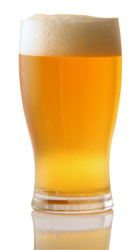
putting my trust in the board
#1

Posted 09 October 2009 - 04:57 AM
#2

Posted 09 October 2009 - 05:34 AM
Zym. What is RA? Not sure I have any advice but just trying to figure out what that acronymn is? Water Chemistry question?You guys told me not to push it above 300 (despite making a 45 SRM beer) and I'm going to heed your advice. Last chance for anyone to tell me I'm doing the wrong thing!I just finished measuring all of my grains out. OATMEAL STOUT HERE I COME!!!
#3

Posted 09 October 2009 - 05:50 AM
correct - it is residual alkalinity. keeping it in certain range based on SRM is a way to help make sure you are hitting the correct pH for your mash.Zym. What is RA? Not sure I have any advice but just trying to figure out what that acronymn is? Water Chemistry question?
#4

Posted 09 October 2009 - 06:21 AM
Sounds good thanks for the clarification. I haven't played the Water Chemistry game with any of my beers. Sorry I can't assist on this one. Good Luck, someone here knows your answer.correct - it is residual alkalinity. keeping it in certain range based on SRM is a way to help make sure you are hitting the correct pH for your mash.
#5

Posted 09 October 2009 - 07:13 AM
#6

Posted 09 October 2009 - 07:34 AM
letting the strike water equalize in the cooler - mashing will commence shortlyGo for it!
#7

Posted 09 October 2009 - 08:07 AM
#8
 *_Guest_Blktre_*
*_Guest_Blktre_*
Posted 09 October 2009 - 08:21 AM
#9

Posted 09 October 2009 - 08:23 AM
Midwest or down under?Around these parts i don't treat my mash water when using dark grains. The dark grains themselves will align my PH all by there cool little selves.
#10
 *_Guest_Blktre_*
*_Guest_Blktre_*
Posted 09 October 2009 - 09:41 AM
#11

Posted 09 October 2009 - 11:05 AM
Edited by NWPines, 09 October 2009 - 11:05 AM.
#12

Posted 09 October 2009 - 11:45 AM
I actually use chalk and baking soda. I put in baking soda such that my sodium levels don't get too high and then finish it off with chalk.Zym, I think I'm in the same boat as you water wise - extremely soft. Even when I do a dark beer with lots of roasted grains, I won't go much over 300 RA regardless of what Palmer's spreadsheet says, and I've had no problems pH wise. Just to get my RA to 300, I have to add a whole lot of chalk and/or baking soda (I tend to prefer chalk because I don't like my Na level getting too high).
#13

Posted 10 October 2009 - 02:54 AM
0 user(s) are reading this topic
0 members, 0 guests, 0 anonymous users








